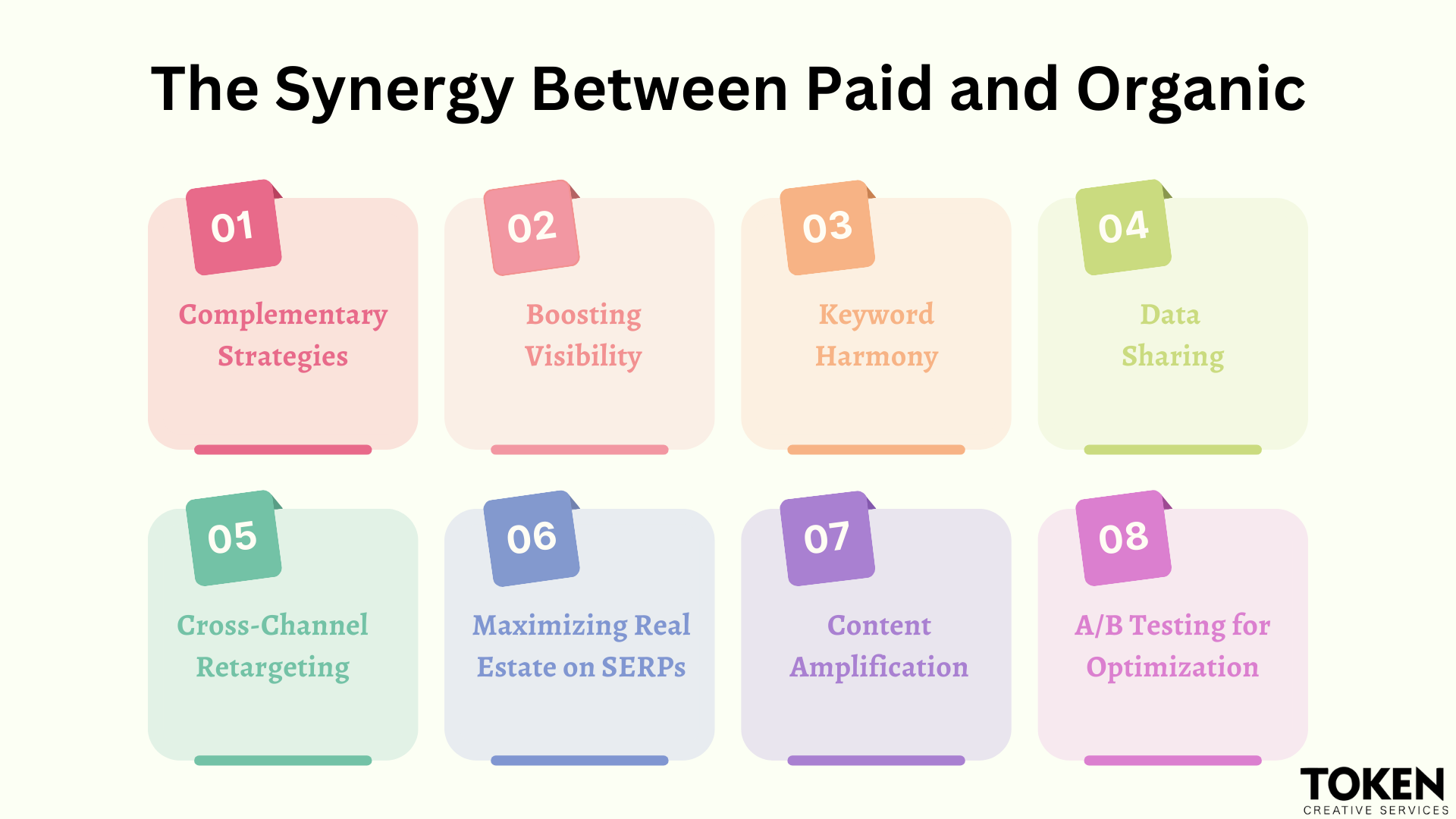Balancing Paid and Organic – Right Approach to ROAS and SEO
Welcome to the dynamic world of digital marketing, where the synergy of paid and organic strategies is paramount for success. In this era of online competition, businesses strive for optimal visibility, engagement, and return on investment (ROI).
Whether you’re a small business owner exploring the benefits of a ROAS Calculator or a seasoned PPC expert looking to refine strategies, understanding the delicate balance between paid and organic efforts is key.
Join us on this journey as we unravel the intricacies, explore the collaboration between SEO services and paid advertising, and provide insights for a holistic approach to maximize your digital presence.
Understanding Paid Advertising
Understanding Paid Advertising is crucial for a comprehensive digital marketing strategy. This facet involves leveraging paid channels such as Google Ads and social media platforms to reach target audiences. Key metrics like Cost Per Click (CPC), Cost Per Mille (CPM), and Return on Advertising Spend (ROAS) play pivotal roles. Paid advertising offers immediate visibility and control over campaign parameters, but it requires a budget.
Exploring its benefits, limitations, and effective use helps businesses enhance brand exposure and drive conversions. Mastering this aspect allows marketers to strategically allocate resources, ensuring a harmonious integration with organic efforts for an impactful and well-rounded digital marketing approach.
Navigating the SEO Landscape
Navigating the SEO Landscape is an essential journey for anyone aiming to optimize online visibility. This involves mastering the basics of Search Engine Optimization (SEO) to enhance organic search rankings.
Focusing on keywords, on-page optimization, and cultivating quality backlinks are integral to this journey. Understanding the impact of algorithm changes and staying abreast of SEO best practices is crucial in adapting strategies for sustained success.
A well-optimized website improves search engine rankings and provides a better user experience. Navigating the dynamic SEO terrain empowers businesses to establish a robust online presence, foster credibility, and ultimately drive organic traffic to achieve their digital marketing goals.
The Synergy Between Paid and Organic

The Synergy Between Paid and Organic is the cornerstone of a successful and holistic digital marketing strategy, combining the strengths of both realms for optimal results.
Complementary Strategies: Paid advertising and organic efforts should align seamlessly, ensuring consistent messaging and a unified brand presence across channels.
Boosting Visibility: While paid advertising provides immediate visibility, organic efforts, such as SEO, contribute to sustained, long-term visibility on search engine results pages (SERPs).
Keyword Harmony: Identify and leverage shared keywords for both paid and organic campaigns. This synergy enhances relevance, ensuring your brand appears consistently for targeted queries.
Data Sharing: Combine insights from both paid and organic channels to refine targeting. Utilize data on consumer behavior and preferences to enhance overall campaign performance.
Cross-Channel Retargeting: Implement strategies where users engaged through paid channels are retargeted through organic channels and vice versa. This reinforces your brand message and increases conversion opportunities.
Maximizing Real Estate on SERPs: Paid ads and organic listings working in tandem can dominate SERPs, increasing the chances of user interaction and establishing brand authority.
Content Amplification: Use paid advertising to amplify the reach of high-performing organic content. Paid campaigns can give an initial boost, driving more organic traffic over time.
A/B Testing for Optimization: Employ A/B testing across paid and organic campaigns to refine strategies. This iterative approach ensures continuous improvement based on real-time performance data.
Developing a Unified Strategy
Developing a Unified Strategy is imperative for a harmonious integration of paid and organic efforts, ensuring a cohesive digital marketing approach that maximizes impact and efficiency.
Audience Alignment: Identify and understand your target audience, ensuring that both paid and organic strategies resonate with their preferences and behaviors.
Consistent Messaging: Craft a unified brand message that seamlessly spans both paid and organic channels, reinforcing brand identity and creating a cohesive user experience.
Keyword Coordination: Coordinate keyword strategies across paid and organic campaigns to establish a strong online presence. This alignment enhances relevance and improves overall search visibility.
Content Synchronization: Align content creation efforts to resonate with both paid ad copy and organic content. This synchronization enhances the overall user journey and supports campaign objectives.
Cross-Platform Optimization: Ensure a consistent user experience across different platforms. Optimize campaigns for various devices and channels to maximize reach and engagement.
Data Integration: Merge data from both paid and organic channels to gain a holistic view of campaign performance. This integration enables data-driven decision-making for ongoing strategy refinement.
Budget Allocation: Strategically allocate budgets based on campaign goals. Balance investment between paid and organic channels to achieve the most effective and efficient outcomes.
Continuous Collaboration: Foster collaboration between teams handling paid and organic efforts. Regular communication ensures a shared understanding of goals and promotes agile adjustments based on real-time insights.
Monitoring and Measuring Success
Monitoring and Measuring Success in a digital marketing campaign is crucial for refining strategies and ensuring a positive return on investment. Employing key performance indicators (KPIs) and analytics tools provides insights into the effectiveness of both paid and organic efforts.
Establish Clear KPIs: Define specific and measurable KPIs aligned with campaign objectives, whether it’s conversion rates, click-through rates, or organic search rankings.
Utilize Analytics Tools: Leverage analytics platforms such as Google Analytics, and social media insights to track and analyze the performance of both paid and organic campaigns.
Conversion Tracking: Implement conversion tracking for paid campaigns to measure the direct impact on sales or desired actions. This ensures a clear understanding of the return on advertising spend (ROAS).
SEO Metrics: Monitor organic search metrics, including organic traffic, keyword rankings, and click-through rates, to gauge the effectiveness of SEO efforts.
Attribution Modeling: Employ attribution models to understand how different touchpoints contribute to conversions. This provides a holistic view of the customer’s journey across paid and organic channels.
Regular Reporting: Generate regular reports to track progress and identify areas for improvement. This allows for timely adjustments to enhance overall campaign performance.
Benchmarking Against Goals: Regularly compare campaign performance against predefined goals to assess success and identify areas that may require optimization.
Top Read:
The ROI of SEO: Elevating Canadian Business Success
Overcoming Challenges
Overcoming Challenges in the integration of paid and organic strategies is pivotal for sustaining a successful digital marketing campaign. Recognizing and addressing common hurdles ensures a resilient and adaptable approach.
Budget Constraints: Strategically allocate resources by balancing paid and organic efforts, optimizing impact within budget limitations.
Algorithm Changes: Stay agile in response to search engine algorithm updates by continuously adapting SEO strategies and staying informed about industry changes.
Keyword Competition: Mitigate keyword competition by identifying niche opportunities and refining targeting strategies for both paid and organic campaigns.
Ad Fatigue: Combat ad fatigue in paid campaigns by regularly refreshing ad creatives and targeting criteria to maintain audience engagement.
Organic Reach Decline: Address declines in organic reach by diversifying content strategies, focusing on high-quality content, and exploring new SEO tactics.
Cross-Channel Coordination: Overcome challenges in coordinating messaging by fostering communication and collaboration between paid and organic teams.
Technical SEO Issues: Tackle technical SEO issues promptly to ensure optimal website performance, including fast loading times and mobile responsiveness.
Data Privacy Concerns: Navigate data privacy concerns by implementing transparent policies and ensuring compliance with evolving regulations.
Future Trends in Digital Marketing
Anticipating Future Trends in Digital Marketing is essential for staying ahead in the ever-evolving landscape. Embrace these predictions to shape a forward-thinking strategy:
AI Integration: Further integration of artificial intelligence will enhance personalization, automate tasks, and refine targeting.
Voice Search Optimization: As voice search continues to rise, optimizing content for conversational queries becomes paramount.
Interactive Content: Interactive content, such as quizzes, polls, and augmented reality experiences, will engage audiences more deeply.
Sustainability Marketing: Consumers are increasingly valuing eco-friendly practices; incorporating sustainability into marketing efforts will become a competitive advantage.
Video Dominance: Video content will maintain dominance, with short-form videos and live streaming gaining prominence.
Ephemeral Content: Temporary, disappearing content on platforms like Snapchat and Instagram Stories will play a bigger role in engaging audiences.
Data Privacy Emphasis: Enhanced focus on data privacy will require marketers to be transparent and respectful of user information.
Also Read:
E-E-A-T in SEO: Unveiling the Importance
Token Creative Services Your True SEO and PPC Experts in Canada
Token Creative Services stands as your premier choice for SEO and PPC excellence in Canada. As dedicated SEO experts, we meticulously optimize your online presence for maximum visibility and organic growth. Our PPC services are tailored to drive targeted traffic, ensuring optimal Return on Advertising Spend (ROAS). With a commitment to innovation and results, we craft bespoke strategies that elevate your brand.
Trust Token Creative Services for unparalleled expertise in SEO and top-tier PPC solutions, propelling your business to the forefront of digital success in the Canadian market. Boost your online performance with our proven track record and commitment to being your true SEO and PPC partners.
Also, do check out our ROAS calculator and plan your strategies accordingly.
Conclusion
In conclusion, achieving a harmonious balance between paid and organic strategies is vital for a robust digital marketing approach. The synergy between these elements maximizes visibility, engagement, and ROI. Continual adaptation, data-driven decisions, and a unified strategy are key to navigating the ever-evolving landscape and ensuring long-term success in the digital realm.
Related Articles
SEO Boosters: 8 User Experience Signals for Higher Rankings!
SEO Tracking: Key Metrics for Business Owners to Track
Let Us help you!
Have a question for our team? Want to learn more about what we offer? Already know what your company needs and just want to have a conversation with us?
Follow us for more helpful content.
Let Us help you!
Have a question for our team? Want to learn more about what we offer? Already know what your company needs and just want to have a conversation with us?
